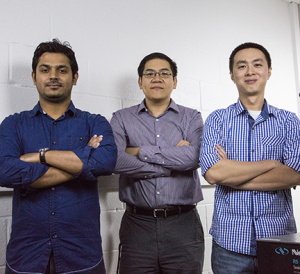Md Masud Parvez Arnob and Hoang Nguyen, both doctoral students at the UH Cullen College of Engineering, won 2nd place for their poster abstract at the 5th Annual Neuroengineering Symposium sponsored by the Gulf Coast Consortia on Oct. 2.
Arnob, an electrical and computer engineering student, and Nguyen, a materials science and engineering student, work together under the supervision of Wei-Chuan Shih, associate professor of electrical and computer and biomedical engineering at Cullen College.
Shih, also an associate professor of chemistry and materials science, was invited to present a broad talk on light-based techniques in neuroscience and neuroengineering relating to the topic of his students’ poster.
Shih presented an array of optoanalytical technologies that he and his team developed for molecular sensing, imaging and stimulation. One project uses a tiny lens to convert a smartphone camera into a powerful microscope. Another focuses on development of a neural probe for delivering light to deep brain regions for simultaneous stimulation and recording of neuronal signals.
“I immediately received feedback regarding potential applications for DotLens Smartphone Microscopy from my colleagues,” Shih said. “The symposium provides an excellent platform for crosscutting idea exchange.”
Arnob and Nguyen competed against 28 other submissions to win one of three awards with their poster, “Micro-machined optical fiber with multiple stimulation sites for optogenetics applications.”
“It was exciting to participate in the symposium and to meet experts in the field of optogenetics, but getting chosen for an award among all the good work was exhilarating,” Arnob said. “We have designed a novel tool for light delivery inside brain tissue and modeled the light-brain interaction, which will facilitate the efficient positioning of recording systems along with the estimation of recorded brain region.”
A grant from the National Institutes of Health, NIH, a CAREER award from the National Science Foundation and another Career award from NASA support Shih’s optics research. The NIH grant specifically funds the neural probe project, which is a collaboration with Jack Wolfe, also a professor of electrical and computer engineering at Cullen College.
“Our novel design addresses the current barrier of having single-fiber waveguide with multiple stimulation sites covering 360-degree excitation capability,” Nguyen said. “It’s always inspiring to be recognized, especially in a competition of excellent peers.”
